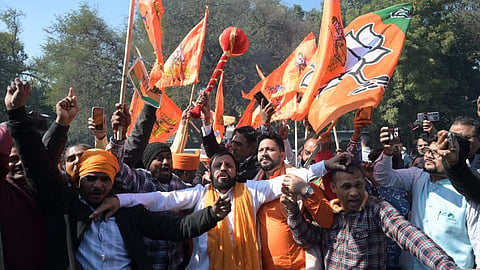

NEW DELHI: The BJP's gains in Delhi can be attributed to a well-thought-out electoral strategy that was put into motion about 18 months before the election date. The party's strategy focused on addressing key issues plaguing people's daily lives, particularly emphasising corruption allegations against AAP leaders, including Arvind Kejriwal.
After being out of power in Delhi for over 25 years, the BJP's think tank had researched what the people needed from the government, and they took action, focusing on problems like the unhygienic state of the Yamuna River, corruption charges, and liquor scams, among other smaller issues that targeted the AAP’s governance.
The RSS, which had a significant role in shaping the election outcomes in Haryana and Maharashtra, also played a major part in Delhi. It conducted over a thousand small meetings across various local pockets, even engaging with intellectual leaders within the Muslim community in areas with a notable Muslim voter presence. A senior BJP leader remarked that the younger generation of Muslims, who were no longer willing to be treated as a vote bank by any single party, showed support for the BJP.
During the election campaign, the BJP faced some challenges, particularly due to controversial remarks by Kalkaji candidate Ramesh Bidhuri. However, the central leadership quickly addressed the issue, issuing a warning to prevent any further statements that could harm the party’s image, especially in terms of disrespecting women.
Meanwhile, Arvind Kejriwal’s comments on the Yamuna river’s pollution and the Poorvanchali voter base became key talking points for the BJP. The central leadership used these comments effectively, turning them into ammunition against AAP.
Prime Minister Narendra Modi’s three rallies, which attracted massive crowds, particularly among women and youth, further boosted BJP’s prospects. BJP spokesperson Prem Shukla emphasised the crucial role of the elderly voters on polling day, which provided additional strength to the party's efforts. Shukla also highlighted Modi’s guarantees for welfare schemes aimed at the poor and middle class, along with strong support from Poorvanchali voters—especially those from Bihar following the budget announcement—helped propel the BJP to victory.
The Delhi Assembly elections have often been a battleground between the Aam Aadmi Party (AAP) and the Bharatiya Janata Party (BJP). In these elections, Arvind Kejriwal has been the central figure for AAP, often positioning himself as a challenger to the BJP's dominance in Delhi. His policies and governance model, which focus on education, healthcare, and public services, have earned him a significant following.
On the other hand, BJP has frequently made Kejriwal the main target of its campaigns, accusing his government of various failures and corruption, despite AAP's success in improving key sectors in Delhi. BJP’s strategy often includes discrediting Kejriwal and presenting him as an ineffective or unreliable leader. Given this dynamic, the result of the Delhi elections could indeed be unpredictable as the early trends emerging from counting show with BJP leading on more than 36 seats and AAP on 23.
If AAP can maintain its strong local appeal while the BJP continues its attacks on Kejriwal, the elections might see surprising outcomes, especially with factors like voter sentiments and any emerging issues in the run-up to the polls. Such campaigns typically bring intense competition, with both parties likely to pull out all stops to sway voters. The ultimate surprise would depend on how the electorate responds to the contrasting narratives each party puts forth in the context of their leadership and governance.
This election in Delhi has turned out an existential challenge for both AAP and BJP in direct or indirect sense of understanding. If Arvind Kejriwal wins, he can keep his party stable, but if he loses, his fight against the BJP in the political battlefield will weaken in the future.
Winning Delhi Dangal this time is no less crucial and necessary for BJP to return to power after a long gap. The BJP has thrown in all its efforts and fleets of leaders to win the Delhi. The on-ground work done silently by the RSS is all set to play a major polarisation to BJP.